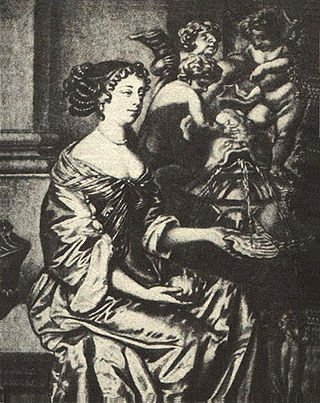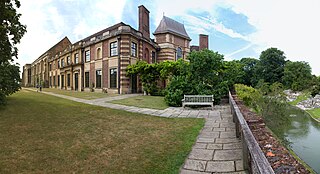Related Research Articles
Elizabeth Boutell, was a British actress.

William Samwell (1628–1676) was an English architect. He was born in Dean's Yard, Westminster, to Anthony Samwell, son of Sir William Samwell, Auditor of the Exchequer to Queen Elizabeth I.

Mary Saunderson (1637–1712), later known as Mary Saunderson Betterton after her marriage to Thomas Betterton, was an actress and singer in England during the 1660s and 1690s. She is considered one of the first English actresses.
Edward Howard was an English dramatist and author of the Restoration era. He was the fifth son of Thomas Howard, 1st Earl of Berkshire, and one of four playwriting brothers: Sir Robert Howard, Colonel Henry Howard, and James Howard were the others. The brothers were sometimes confused in their own era, and Edward was sometimes given credit for his brother Henry's play The United Kingdoms.
Sir Robert Stapylton or Stapleton was an English courtier, dramatic poet and translator.
Sir Robert Harley FRS was an English politician who sat in the House of Commons from 1647 to 1648 and in 1660.
Anne Shadwell was an English stage actor of the seventeenth century. She was one of the first English actresses to appear on stage following the Restoration She was one of six actors recruited in 1660 by William Davenant for the new Duke's Company, acting under her maiden name Anne Gibbs. Sometime between 1663 and 1667 she married the playwright Thomas Shadwell with whom she had four children. While some sources have her acting late into the century, it may be she effectively retired with the formation of the United Company in 1682. Her appearances had decreased since 1672. Following her husband's death in 1692 she was left the bulk of his estate. She had an investment in the Drury Lane Theatre in 1709, when she joined a petition to Queen Anne by the manager Christopher Rich, but nothing is known about her after this point.

Sir John Shaw, 1st Baronet of Eltham Lodge, Kent was an English merchant and politician who sat in the House of Commons from 1661 to 1679.
Samuel Sandford was an English character actor, known for his roles as villains.
Elinor Leigh was a British stage actor of the seventeenth century.
Philip Cademan was an English stage actor of the Restoration era.
Matthew Medbourne was an English stage actor and occasional playwright of the Restoration era. A long-standing member of the Duke's Theatre, Medbourne was a victim of the Popish Plot scare and died in Newgate Prison.
John Young was an English stage actor of the seventeenth century. He was active as a member of the Duke's Company during the Restoration Era, appearing at Lincoln's Inn Fields and then at the Dorset Garden Theatre when the company relocated. While not much is known about his background, he was repeatedly in debt during his acting career. In 1667 he stood in for Thomas Betterton after he fell ill during the run of Macbeth appearing as the title role. Samuel Pepys described him as "a bad actor at best".

Henry Harris was an English stage actor and theatre manager. Initially a painter he was a founder member of the new Duke's Company in 1660 following the Restoration which established itself at the old Salisbury Court Theatre before moving to the new Lincoln's Inn Fields Theatre shortly afterwards. Due to his background Harris may have been a set designer and painter during his early years with the company. However, by 1661 he was acting, and his first recorded role was in William Davenant's The Siege of Rhodes that summer. He quickly established himself as the second actor in the troupe after Thomas Betterton.
John Crosby was an English stage actor of the Restoration Period. He first recorded performance is in 1662 when he appeared in Ignoramus at Whitehall Palace, likely as a child actor. It was further eight years before he was solidly established in the Duke's Company in 1670 beginning with The Forc'd Marriage by Aphra Behn. He became a regular with the company over the following decade, often playing young lover roles. He retired from the stage in 1679 and later became a justice of the peace for Middlesex. He died on 8 April 1724 and was buried in St Sepulchre.
Edward Angel was an English stage actor of the early Restoration Era. Along with James Nokes and Cave Underhill he was one of the leading comedians of the period. It is possible he began his career as a boy actor during the pre-English Civil War era, but he was an experienced actor by the time he was a member of John Rhodes's troupe in 1660. From 1662 he acted with the Duke's Company, initially at Lincoln's Inn Fields and after 1671 at the new Dorset Garden Theatre.

Joshua Marshall (1628–1678) was a 17th century English mason and sculptor. As the King's Master Mason at the time of the Great Fire of London he was responsible for many of the rebuilding projects and worked closely with Christopher Wren and was the builder of several "Wren churches".
References
- ↑ Howe p.75-76